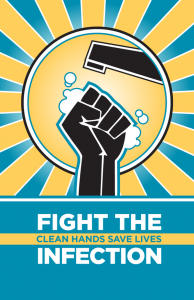
In areas of the world with poor access to clean water, the spread of infection happens quickly and can have devastating effects. The World Health Organization (WHO) reported that prior to the introduction of revised infection prevention and control practices, such as hand washing protocols, to healthcare facilities in Ghana, as many as 19% of infants born in hospitals were afflicted with sepsis, a serious and life-threatening form of infection.
As patients, we trust that the healthcare professionals caring for us are compassionate competent in their practice. We also expect that their practices are safe, follow current regulations and best practice recommendations, as well as aim to do no harm. However, the Centers for Disease Control and Prevention (CDC), report that a staggering number of healthcare professionals fail to complete proper hand hygiene at key moments of care for optimal infection control practice. Knowing the facts about hand washing and asking your healthcare provider to complete proper hand hygiene can help to keep you and your loved ones in good health. One study found that fifty percent of the public surveyed was uncomfortable with requesting that their healthcare provider wash their hands, but only five percent of healthcare providers reported actually being uncomfortable in these situations (Flannigan, 2015). So, as a patient, how do we approach healthcare professionals about hand washing to advocate for ourselves? First, we need to understand proper hand hygiene. Hamilton Health Sciences explains the powerful effects properly washing your hands has on reducing the spread of illness.
 The CDC stresses that it is ok to ask your healthcare provider questions, including if they have washed their hands prior to performing your health assessment and makes several recommendations on how to start that conversation, such as asking “I’m worried about germs spreading in the hospital. Will you please clean your hands once more before you start my treatment?” Unsure about how to practice excellent hand washing yourself? The CDC has you covered in the video below by address some frequently asked questions.
The CDC stresses that it is ok to ask your healthcare provider questions, including if they have washed their hands prior to performing your health assessment and makes several recommendations on how to start that conversation, such as asking “I’m worried about germs spreading in the hospital. Will you please clean your hands once more before you start my treatment?” Unsure about how to practice excellent hand washing yourself? The CDC has you covered in the video below by address some frequently asked questions.
References
Centers for Disease Prevention and Control. (2016, March, 15). Hand Hygiene in Healthcare Settings. Centers for Disease Control and Prevention. https://www.cdc.gov/handhygiene/patients/index.html
World Health Organization. (2019, May, 2). Hand hygiene – a driver of quality care. World Health Organization. https://www.who.int/news-room/feature-stories/detail/hand-hygiene-a-driver-of-quality-care
Flannigan, K. (2015). Asking for hand hygiene: Are patients comfortable asking, and, are healthcare providers comfortable being asked? Canadian Journal of Infection Control, 30(2), 105–109.
